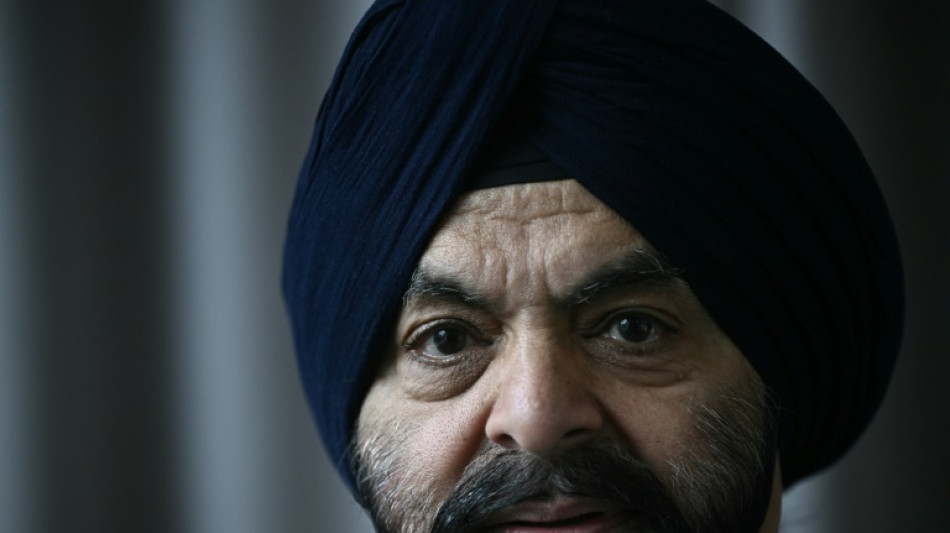
-
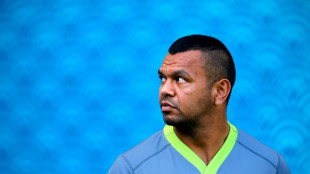 Veteran Wallaby Beale set for long-awaited injury return
Veteran Wallaby Beale set for long-awaited injury return
-
Syria's Druze take up arms to defend their town against Islamists

-
 Tesla sales plunge further in France, down 59% in April
Tesla sales plunge further in France, down 59% in April
-
US calls on India and Pakistan to 'de-escalate'

-
 Israel reopens key roads as firefighters battle blaze
Israel reopens key roads as firefighters battle blaze
-
Europe far-right surge masks divisions

-
 James will mull NBA future after Lakers playoff exit
James will mull NBA future after Lakers playoff exit
-
Ukraine's chief rabbi sings plea to Trump to side with Kyiv

-
 Australian mushroom meal victim 'hunched' in pain, court hears
Australian mushroom meal victim 'hunched' in pain, court hears
-
Lakers dumped out of playoffs by Wolves, Rockets rout Warriors

-
 Booming tourism and climate change threaten Albania's coast
Booming tourism and climate change threaten Albania's coast
-
US reaching out to China for tariff talks: Beijing state media

-
 Tariffs prompt Bank of Japan to lower growth forecasts
Tariffs prompt Bank of Japan to lower growth forecasts
-
Kiss faces little time to set Wallabies on path to home World Cup glory

-
 Serbian students, unions join forces for anti-corruption protest
Serbian students, unions join forces for anti-corruption protest
-
Slow and easily beaten -- Messi's Miami project risks global embarrassment

-
 Fan in hospital after falling to field at Pirates game
Fan in hospital after falling to field at Pirates game
-
Nuclear power sparks Australian election battle

-
 Tokyo stocks rise as BoJ holds rates steady
Tokyo stocks rise as BoJ holds rates steady
-
Bank of Japan holds rates, lowers growth forecasts

-
 'Sleeping giants' Bordeaux-Begles awaken before Champions Cup semis
'Sleeping giants' Bordeaux-Begles awaken before Champions Cup semis
-
Napoli eye Scudetto as Inter hope for post-Barca bounce-back

-
 Germany's 'absolutely insane' second tier rivalling Europe's best
Germany's 'absolutely insane' second tier rivalling Europe's best
-
PSG minds on Arsenal return as French clubs scrap for Champions League places

-
 UK WWII veteran remembers joy of war's end, 80 years on
UK WWII veteran remembers joy of war's end, 80 years on
-
Myanmar junta lets post-quake truce expire

-
 Rockets romp past Warriors to extend NBA playoff series
Rockets romp past Warriors to extend NBA playoff series
-
Messi, Inter Miami CONCACAF Cup dream over as Vancouver advance

-
 UN body warns over Trump's deep-sea mining order
UN body warns over Trump's deep-sea mining order
-
UK local elections test big two parties

-
 US judge says Apple defied order in App Store case
US judge says Apple defied order in App Store case
-
Seventeen years later, Brood XIV cicadas emerge in US

-
 Scorching 1,500m return for Olympic great Ledecky in Florida
Scorching 1,500m return for Olympic great Ledecky in Florida
-
Israel's Netanyahu warns wildfires could reach Jerusalem

-
 Istanbul lockdown aims to prevent May Day marches
Istanbul lockdown aims to prevent May Day marches
-
Formation Metals Announces Appointment of Adrian Smith to Advisory Committee

-
 Cerrado Gold Announces Q4 And Annual 2024 Financial Results
Cerrado Gold Announces Q4 And Annual 2024 Financial Results
-
Australian guard Daniels of Hawks named NBA's most improved

-
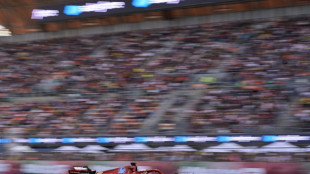 Mexico City to host F1 races until 2028
Mexico City to host F1 races until 2028
-
Morales vows no surrender in bid to reclaim Bolivian presidency
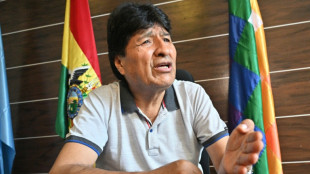
-
 Ukraine, US sign minerals deal, tying Trump to Kyiv
Ukraine, US sign minerals deal, tying Trump to Kyiv
-
Phenomenons like Yamal born every 50 years: Inter's Inzaghi

-
 Ukraine, US say minerals deal ready as Kyiv hails sharing
Ukraine, US say minerals deal ready as Kyiv hails sharing
-
Global stocks mostly rise following mixed economic data
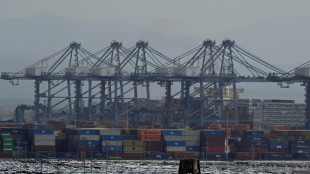
-
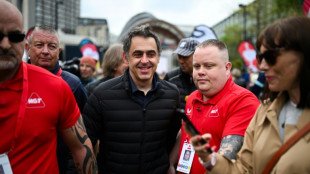 O'Sullivan says he must play better to win eighth snooker world title after seeing off Si Jiahui
O'Sullivan says he must play better to win eighth snooker world title after seeing off Si Jiahui
-
Sabalenka eases past Kostyuk into Madrid Open semis

-
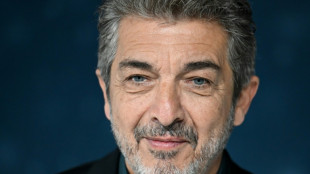 Netflix's 'The Eternaut' echoes fight against tyranny: actor Ricardo Darin
Netflix's 'The Eternaut' echoes fight against tyranny: actor Ricardo Darin
-
US economy unexpectedly shrinks, Trump blames Biden
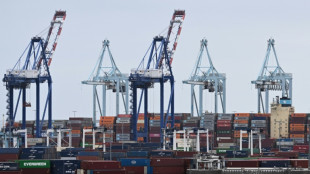
-
 Barca fight back against Inter in sensational semi-final draw
Barca fight back against Inter in sensational semi-final draw
-
Meta quarterly profit climbs despite big cloud spending
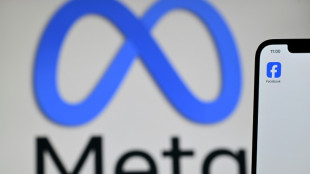

Developing countries should fast-track US trade deals: World Bank president
Developing countries should strike swift trade deals with the United States at the "earliest possible" opportunity, the president of the World Bank told AFP Friday, after a busy week with global financial leaders in Washington.
Ajay Banga was interviewed by AFP at the World Bank and International Monetary Fund's Spring Meetings, which have been held this year under a cloud of uncertainty about President Donald Trump's stop-start tariff rollout.
The Bank has been advising developing countries to get a deal done quickly with the United States, and to then focus attention on cutting trade barriers and boosting regional flows of goods, Banga said.
"You need to negotiate trade systems with the US at the earliest possible," he said. "If you delay, it hurts everyone."
Trump's tariffs have roiled financial markets, sent volatility surging and spooked investors and consumers.
Since returning to office in January, the US leader has imposed a "baseline" 10 percent tariff on most countries, with much higher duties on China, and 25 percent sector-specific levies on areas including steel, aluminum, and automobiles not manufactured in the United States.
He also introduced much higher tariffs on dozens of countries -- which have since been temporarily paused -- accusing them of having an unfair trade balance with the United States.
- Bessent 'not wrong' on China -
Banga also addressed the criticism levelled by new US Treasury Secretary Scott Bessent at the Bank earlier this week.
Bessent criticized China's "absurd" developing country status and called on Banga and IMF Managing Director Kristalina Georgieva to "earn the confidence of the administration."
"I don't think he's wrong," Banga said of Bessent's comments on China.
"A country that is the size of China and the capability of China, at some point, should no longer be taking money from IBRD," he said, referring the International Bank for Reconstruction and Development -- an arm of the World Bank that lends largely to middle-income countries.
China, he said, still borrowed around $750 million from the IBRD last year, while paying in billions of dollars to the Fund in repayments and donations.
"My view is, I've brought it down to 750 (million), and I'm trying to figure out a way to deal with China to bring it down further," he said. "I want to get it done. And that's what I'm talking to the Chinese about."
Banga said the Trump administration's broader criticisms of the World Bank were not unusual, citing newly-elected governments over the past year in countries including France, Japan, and Korea.
"I keep telling people this is a perfectly constructive request, to say, tell me and show me that you guys are the kind of people that advance the interests of my taxpayer, of my country," he said.
"I take it in that spirit," he said. "There's nothing wrong with it."
- Energy at 'lowest possible cost' -
Since taking the helm of the Washington-based development lender in 2023, Banga has pushed to streamline its operations and encourage private sector participation, while focusing on job creation and electricity connectivity.
Among the Bank's current priorities is a push with the African Development Bank to connect 300 million people in sub-Saharan Africa to electricity by 2030 -- a process that will require a vast amount of new energy to be brought online.
"You should try and get (energy) in the best, accessible way and the lowest possible cost," Banga said, suggesting that in addition to renewable power, nuclear and gas could help provide a base load -- two energy sources the World Bank is currently hesitant to finance.
The Bank's executive board is set to discuss its energy strategy in June, Banga said, adding that funding for both nuclear and gas would likely be on the agenda.
Banga said the Bank is also pushing to encourage great private sector job creation in developing countries -- beyond simply outsourcing jobs from advanced economies.
"Because then you end up with challenges in (advanced economies), and you can see that people are speaking about them with their votes," he added.
Ch.Kahalev--AMWN